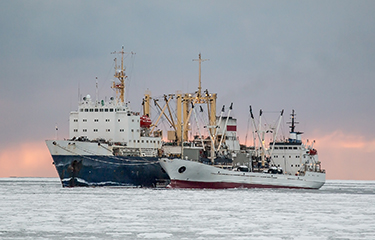A group of 130 carrier vessels, overwhelmingly flagged to a small list of countries, are responsible for over 70 percent of transshipments around the world, according to recent Pew Charitable Trusts-funded research.
The report, published 19 April by the John Jay College of Criminal Justice at the City University of New York, studied 12,322 regional fisheries management organization (RFMO)-recorded transshipments, finding that 130 out of around 600 carrier vessels were responsible for the vast majority of them.
Out of the vessels in question, most were flying the flags of either Taiwan, Liberia, Panama, or China, with 24 percent of transshipments linked to interactions between the latter two countries. Panama-flagged fishing vessels were also responsible for the first-, third-, and fourth- ranked number of transshipment pairings with China-, Taiwan- and South Korea-flagged carrier vessels, respectively.
Taiwan-flagged carriers linking up with Taiwan-flagged fishing vessels accounted for 13 percent of all transshipments, the second-largest rate of incident after the China-Panama connection.
“Countries are always responsible for the vessels that carry their flags,” The Pew Charitable Trusts International Fisheries Manager Jamie Gibbon said. “If we’re seeing an increasing trend of carrier vessels that are flying one flag or an increasing trend of fishing vessels with one flag transshipping with another country’s vessels, that’s where we know there needs to be a focus on monitoring and regulation.”
Transshipment occurs when carriers meet fishing vessels at sea to transfer the catch the latter vessels have hauled in, which allows fishing vessels to stay at sea longer and reduce operating costs related to return trips to port.
The risk of illicit activity – such as misreporting or nonreporting of catch; workers’ rights abuses; and instances of trafficking people, weapons, and drugs – increases with transshipments, especially in regions that have inadequate monitoring and regulatory control measures. This is because these interactions often take place in international waters, often clustering just outside of countries’ exclusive economic zones (EEZs) to avoid detection.
The study, using automatic identification systems (AIS) data from 2015 to 2020, focused on transshipment events occurring in seven RFMO-managed regions: the Commission for the Conservation of Southern Bluefin Tuna (CCSBT), the International Commission for the Conservation of Atlantic Tunas (ICCAT), the Inter-American Tropical Tuna Commission (IATTC), the North Pacific Fisheries Commission (NPFC), the South Pacific Regional Fisheries Management Organizations (SPRFMO), the Western and Central Pacific Fisheries Commission (WCPFC), and the Indian Ocean Tuna Commission (IOTC).
“One of the regions that is still behind is the WCPFC … the region that has the most tuna transshipped in the world and makes up a huge majority of the fish that goes into global markets,” Gibbon said. “They are still [operating with] outdated transshipment measures, and they haven’t made a lot of progress. That’s really where we’d like to see efforts focused … is getting the WCPFC to update their measures to incorporate best practices.”
Notable hot spots of transshipment …
Photo courtesy of knyazev Vasily/Shutterstock








